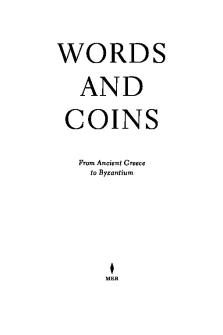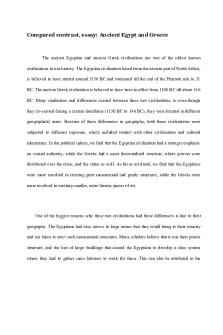WA Unit 1 - Two of the most powerful city-states in ancient Greece were Athens and Sparta. PDF

| Title | WA Unit 1 - Two of the most powerful city-states in ancient Greece were Athens and Sparta. |
|---|---|
| Course | History Greek & Roman Civilization |
| Institution | University of the People |
| Pages | 3 |
| File Size | 66 KB |
| File Type | |
| Total Downloads | 73 |
| Total Views | 144 |
Summary
Two of the most powerful city-states in ancient Greece were Athens and Sparta....
Description
In ancient Greece, city-states held a lot of autonomy. For the most part, Greece didn't act as a whole, but as a collection of smaller pieces. In fact, these city-states were often even at war with one another. As such, there were major differences in how each city-state was run and in how much power citizens had within their respective city-states. Two of the most powerful city-states in ancient Greece were Athens and Sparta.
Sparta In Spartan society, only warriors had a right to engage in politics and make decisions for everyone. Additionally, ancestry had a big part in who had rights and not. Only Spartans had rights in government, with other groups having various levels of inferiority to them. For example, the Helots had no rights at all, while the Periokoi had much more freedom, though still no say in government. The Helots were slaves to the Spartans, while the Periokoi were partially able to manage their own affairs, while still owing military service to the Spartans. For Spartans though, the right to live was granted or revoked soon after birth, and unfit babies were thrown to their death into a ravine. Spartans enjoyed certain rights, but were unable to even choose their own careers. Males were raised to be soldiers and females were raised to be baby factories. Women had no rights and no independence in most of Greek societies, but in Sparta, women enjoyed more power and freedom. While men were soldiers, women were left home to manage household affairs. (Brand, n.d.)
Spartan government was a bit different than other governments in that there were two kings at any given time, kings from different bloodlines. Five elected magistrates with yearlong terms and an elected group of twenty-eight males over sixty years of age and lifelong terms held much power as well. When at war, one king would go to battle with their army, while the other stayed home to manage Sparta. Two of the magistrates came with the army-leading king to put a check on that king's power, a policy that hadn't always been in place. Before this policy had been enacted, the king's power was nearly unlimited when in battle, though not the case when at home. There were originally only three magistrates, though later, five were elected annually, and no magistrate could be elected to serve more than one term. These magistrates, also known as Ephors, helped form the executive branch of the government, along with the two kings. The kings and the magistrates worked together, swearing oaths of loyalty to one another. (Brand, n.d.)
The Gerousia was a council of elders, formed of the two kings and twenty-eight aristocrats of at least sixty years of age. Only male aristocrats and kings were allowed to serve as part of the Gerousia, so again, bloodlines and sex were important in determining what rights a citizen held. Once a member of the Gerousia, one served for life, unlike the yearly-elected magistrates. Before any political matter could be brought to the popular assembly, the Gerousia had to approve of it, and the Gerousia held much influence (and thus unofficial power) over the magistrates. (Brand, n.d.) The popular assembly was a group comprised of all free, rights-holding male citizens. Sex and bloodlines again determined the level of political power one could have, as those born as females, Helots, and/or 1
Periokoi were not permitted to participate. The assembly was able to elect magistrates yearly, and when a member of the Gerousia died, they could elect the new member to fill their place. However, they otherwise didn't have much power. The Gerousia was in control of what issues were even brought before the assembly, and could even overrule decisions made by the assembly. Males could also lose their political rights for failing to join a syssitia (dining group) or failing to provide food for their syssitia. At that point, they no longer had a right to vote or a right to hold office. (Brand, n.d.)
Athens In Athenian society, the aristocratic landowners held the majority of the power. Because these people had all the best land, the poorest farmers ended up having to take on debt to them in order to survive, often selling off what little land they had, themselves, and/or even their families. Middle class citizens were better off, and fought for political rights. Meanwhile, the upper class fought amongst themselves for power. This led to a downward spiral of social unrest that eventually had to be dealt with. The aristocrats chose one of their number to reform society and fix the major problems. (Brand, n.d.)
Solon, the person chosen to fix society, outlawed debt-based slavery, making it illegal to use oneself as loan collateral and restoring freedom to those that already had. Additionally, they made it illegal to use one's own land as collateral. Society was then divided by wealth instead of bloodline, so wealthy nonaristocrats had the same political power as wealthy aristocrats. Lastly, they tried to improve their olive oil and pottery exports in an attempt to raise money to cover the food Athens had to import to feed their citizens. All of this was helpful, but it wasn't enough and left enough social unrest to leave the political system open to a couple takeovers. (Brand, n.d.)
Next, the aristocrats chose another person from their ranks, Cleisthenes, to try to fix Athens' still-broken society. After Solon had attempted reform, Athens was unintentionally broken into three main factions. Cleisthenes further broke up Athens, forming its population into ten tribes, each with citizens from each of the three former factions. This brought people of the three factions closer together, but due to the new tribes being even smaller, also took influence away from the aristocrats. No longer could they be as effective at controlling the political system. Fifty councillors from each tribe were chosen each year to serve in the legislative council, called the Boule. The Boule decided on laws to pass, then the popular assembly, made up of all free Athenian males, voted to either pass or reject the laws. The aristocratic minority no longer had control over the non-aristocratic majority, as half of the Athenian people, both aristocratic and not, had a vote. (Brand, n.d.) In this new system, to have a say in government, one must be male, must be free, and must be of Athenian decent. Like in Sparta, sexism and racism kept females and foreigners from participating in governmental decisions. Additionally, those under twenty years of age were excluded from the popular assembly. The reading material isn't clear on how councillors were chosen though. Were they elected within each tribe? Were they appointed by some sort of leaders, either within the tribes or without?
2
Instead of a king, ten generals were elected yearly, along with many other government officials. (Brand, n.d.)
Later, the popular assembly, made mostly of the poor majority, voted to build a naval force of two hundred trireme ships. These ships each needed about one hundred seventy rowers to power them, and the poor majority served as these rowers; they were free men though, and paid for their efforts. Now being able to help defend their homeland, they now had the leverage needed to obtain power in government. Previously, only the wealthy could become public officials, but the doors to public office were now more open for the poor majority to enjoy as well. That said, an even greater majority of women, foreigners, and slaves still had no power whatsoever in governmental affairs. Furthermore, which offices could be filled by a particular person with political rights were determined by that person's wealth, and no one could serve in office until they were at least thirty years in age. The poorest people, those who could only serve as rowers in the navy, weren't eligible for public office at all, but could serve on juries. Minor officials (and jurors) were chosen by lottery, and were not elected. (Brand, n.d.)
Conclusion The governmental structures of both city-states were highly sexist and racist. Neither women nor foreigners had any say in government. That said, while women in Sparta had no political power, they enjoyed more power in the home than women of other city-states. Additionally, it seems in both that political power was heavily tied to service in the military. In Sparta, lack of military service meant lack of rights. In Athens, the poorest people had less political power until they voted in the trireme ships that needed these poor people as rowers. However, Sparta had offices that could only be filled by certain families, unlike Athens. Namely, the job of each king could only be filled by a member of one specific family each, though each of the two positions of king was controlled by a different family.
We still have a long way to go, but we've come pretty far from the state these two city-states were in. Many countries today at least mostly try to treat both sexes mostly equally, and foreigners enjoy many more rights than they used to. References: Brand, P. J. (n.d.). Athens & Sparta. Retrieved from https://my.uopeople.edu/mod/resource/view.php? id=109439
3...
Similar Free PDFs

Death in Ancient Greece
- 6 Pages

HSC Ancient - Sparta
- 21 Pages

Ancient Greece Part B
- 2 Pages

21 Most Powerful Words pdf
- 14 Pages

Athens in the 5th Century
- 3 Pages

Women in Egypt and Greece
- 4 Pages

Crimes of the Powerful Essay
- 7 Pages
Popular Institutions
- Tinajero National High School - Annex
- Politeknik Caltex Riau
- Yokohama City University
- SGT University
- University of Al-Qadisiyah
- Divine Word College of Vigan
- Techniek College Rotterdam
- Universidade de Santiago
- Universiti Teknologi MARA Cawangan Johor Kampus Pasir Gudang
- Poltekkes Kemenkes Yogyakarta
- Baguio City National High School
- Colegio san marcos
- preparatoria uno
- Centro de Bachillerato Tecnológico Industrial y de Servicios No. 107
- Dalian Maritime University
- Quang Trung Secondary School
- Colegio Tecnológico en Informática
- Corporación Regional de Educación Superior
- Grupo CEDVA
- Dar Al Uloom University
- Centro de Estudios Preuniversitarios de la Universidad Nacional de Ingeniería
- 上智大学
- Aakash International School, Nuna Majara
- San Felipe Neri Catholic School
- Kang Chiao International School - New Taipei City
- Misamis Occidental National High School
- Institución Educativa Escuela Normal Juan Ladrilleros
- Kolehiyo ng Pantukan
- Batanes State College
- Instituto Continental
- Sekolah Menengah Kejuruan Kesehatan Kaltara (Tarakan)
- Colegio de La Inmaculada Concepcion - Cebu








